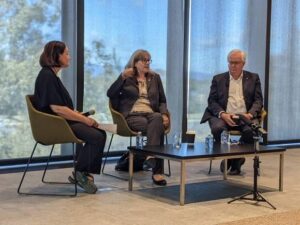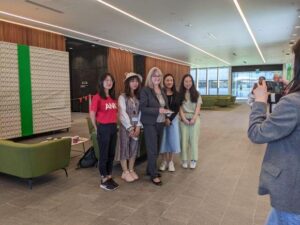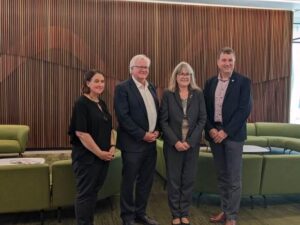Optics meets optimism: Physics Nobel Laureate Professor Donna Strickland on lasers and life
08 Dec, 2022
Professor Donna Strickland is the 2018 Nobel Prize Winner for her role in creating the “laser hammer” in the 1980’s, which is the scientific basis for the technology that allows the ultra-precise cuts required for laser eye surgeries, micromachining for electronics, and beyond.
We were honoured to host Professor Strickland at the ANU Research School of Physics in Canberra, with the Australian Academy of Sciences, Optics Student Society, and the ANU Women* in Physics group.
Professor Strickland’s research involves specialist high-intensity lasers, which are now “hidden” in everyday objects. Her work, and those of other scientists across more than 60 years since the laser was first invented, and the 40 years prior from Einstein’s theories which provided the concepts, are essential to technological development in 21st-century life.
Lasers are everywhere. We like to say that but most of the time you don’t know about it. Most of the time you’re not thinking it’s lasers that are taking your telephone conversation across the ocean to another place, it’s the fact that there’s like a million lasers in every Google data centre, and that because even though it’s stored electronically, information goes from piece to piece, optically. I mean, optics is everywhere, and lasers are usually where we make the light now.
Professor Donna Strickland
Professor Strickland, faculty member at the University of Waterloo, shares her message to Australian audiences that physics is fun.
Experimental physics is especially fun. Not only do you get to solve puzzles about the universe or here on earth but there are really cool toys in the lab.
Professor Donna Strickland
On having a career in scientific research, Donna says that “confidence is key, believing that you have opportunities is what keeps you open to them.” Being able to step away from ourselves and into the scientific method is a skill that opens a world of puzzles to be solved. Along this pathway are many failures simply because we do not have the answers yet – it’s nothing personal.
Professor Strickland maintains that acceptance, patience, and creativity help us in maintaining a positive outlook, and remembering that “physics is a team sport” reminds us of the fun that such a career involves. But perhaps the secret to her success is her mindset. “I believe I am lucky in life,” Professor Strickland says.
TMOS Centre Director, Professor Dragomir Neshev, reflects on Professor Strickland’s message.
In Donna’s darkest moments during her PhD, she took an optimistic perspective. Things may not be going how you wanted but it could be taking you somewhere better. I feel inspired by that message of letting go and believing that things can work out in science and in life.
Professor Dragomir Neshev
Professor Strickland continues her public lecture tour around Australia with the support of the Australian Academy of Science.


